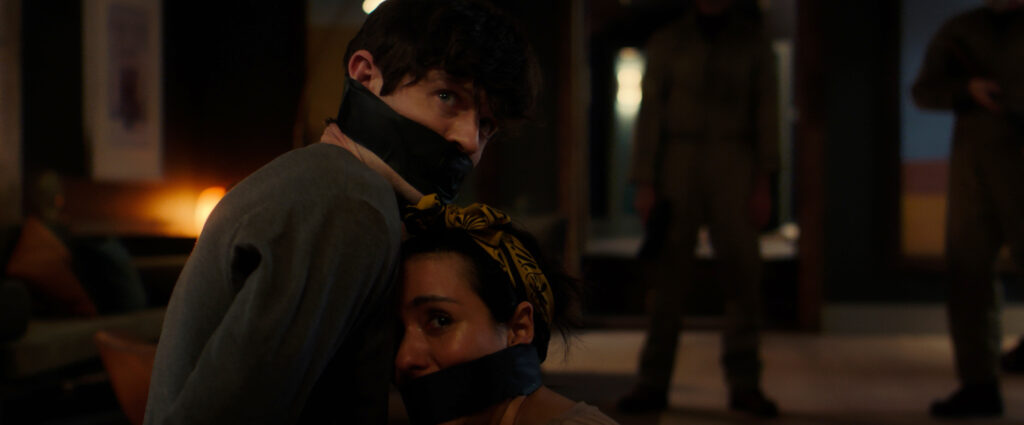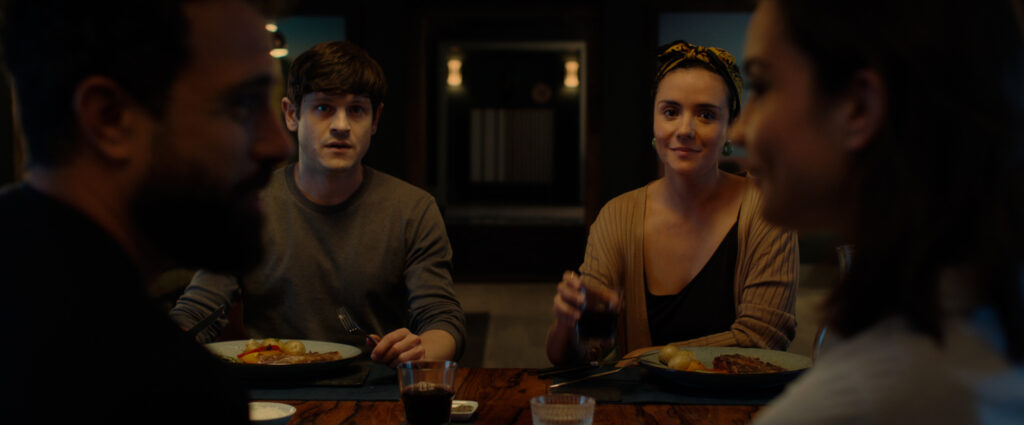March 11, 2023
by Carla Hay

Directed by Tal Granit and Sharon Maymon
Culture Representation: Taking place mainly in London, the comedy/drama film “My Happy Ending” features a predominantly white cast of characters (with a few black people and people of South Asian heritage) representing the working-class, middle-class and wealthy.
Culture Clash: While in London to work in a West End play that flops, a famous American actress reluctantly gets treatment for Stage 4 colon cancer in a public hospital, where she makes unexpected friends with three other female cancer patients.
Culture Audience: “My Happy Ending” will appeal primarily to people who are fans of Andie MacDowell and movies that have simple-minded depictions of cancer treatment.

“My Happy Ending” is anything but joyful. The only happy ending that viewers might get from watching this poorly made and fake-looking cancer comedy/drama is when this boring train wreck is finally over. Tamsin Greig gives the movie’s only adequate performance. Everyone else’s acting falls flat.
Directed by Tal Granit and Sharon Maymon, “My Happy Ending” is based on the play “Sof Tov,” written by Anat Gov. Rona Tamir wrote the shoddy adapted screenplay for “My Happy Ending.” Most of the movie takes place in the section of a London hospital where cancer patients are being treated. Anyone who endures the entirety of this dreadful film will have to sit through tiresome scenes that either show people complaining about something, gossiping about other people, or having fantasies about being in an exotic place.
Almost nothing about this movie looks authentic, including the fact that the story’s protagonist has Stage 4 colon cancer, but she never looks like she’s sick or in pain. Cancer just seems to be used as a cheap gimmick to get laughs from listless and unfunny dialogue posing as “jokes.” Cancer is a tricky subject to cover for entertainment. “My Happy Ending” fails miserably on every single level.
The improbably healthy-looking Stage 4 cancer patient who’s at the center of “My Happy Ending” is a famous American actress named Julia Roth (played by Andie MacDowell), who spends much of the movie whining that she doesn’t want to be at this hospital that isn’t private enough for her. Considering all the hospitals that exist in England, viewers will constantly be thinking this solution to Julia’s hospital problem: “Why don’t you just leave?” It’s the same question that viewers might be thinking if they’re stuck watching this movie somewhere and are debating whether or not to keep watching this mopey garbage.
The movie has this flimsy excuse for why Julia doesn’t leave the hospital that she’s constantly griping about: Her main physician Dr. Fletcher (who is never seen or heard in the movie), who is in the United States, recommended her to Dr. Ben Hanson (played by Tom Cullen), who only works at this particular hospital. Someone should have told Julia: “Haven’t you heard of getting another doctor’s opinion?”
Julia also reveals about halfway through the movie that she only recently found out that she has cancer, and she doesn’t know what Stage 4 cancer means. It means she needs to get a better doctor. And it means this movie needed a better screenplay.
These are just a few of many reasons why “My Happy Ending” falls off the rails over and over again in pathetic attempts to be a “female empowerment” film. Most of the scenes with the female cancer patients together show that the women are too gossipy and too catty to become real friends. Julia is uncomfortable because she’s put in an infusion therapy room with three other female patients, who immediately recognize her. Julia throws a little bit of a diva tantrum, because she was promised her own private room for the infusion treatments, but she’s told by a no-nonsense nurse named Emilia (played by Michelle Greenidge) that Julia has no choice but to be in this shared room with other patients.
What is Julia doing in London? She recently starred in a West End play that flopped. (The play opened and closed during the same week.) Even though Julia is famous, her career peaked years ago. She blames her “has-been” status on sexism and ageism against women who are over the age of 50. It’s probably the only complaint that Julia makes that sounds believable and grounded in reality.
Julia has only told a few people she has cancer. Members of her immediate family do not know yet. Julia is also very paranoid that the media will find out about her cancer. Julia tries to hide in a section of the room that has a thin fabric partition, similar to a shower curtain, but it’s a futile attempt to get some privacy, because three nosy women in the room can still hear Julia talking on the phone and talking to hospital employees.
The three other cancer patients in the room are star-struck that celebrity Julia is in their midst while also envious that Julia still has a full head of hair. Middle-aged Mikey (played by Sally Phillips) is an intrusive busybody and a single mother who regrets being a neglectful parent when she was younger. Elderly cynic Miriam (played by Miriam Margolyes) is a Holocaust survivor who says she was born in the Auschwitz concentration camp. Young married mother Imaan (played by Rakhee Thakrar) is the quietest and most mild-mannered of these three women. It turns out that Mikey is a big fan of Julia and is kind of obsessed with her, which makes Mikey look creepy and weird.
Julia has a very hyper and snobby manager named Nancy (played by Greig), who is openly a lesbian and just so happens to be the sister of Julia’s ex-husband. (The ex-husband is never seen or heard in the movie.) Even though that marriage failed, the friendship of Nancy and Julia survived the divorce. Nancy is Julia’s closest friend, which is a sign that Julia is a lonely person if her closest friend is also her manager. Nancy, who is an ambitious schemer, is the only person in Julia’s inner circle who knows about Julia’s cancer.
Julia has a daughter in her 20s named Cassidy (played by Lily Travers), who is getting married in an upcoming wedding. Julia frets about what Julia will look like when she’s at the wedding. “My Happy Ending” has a scene where Julia reacts in horror when she imagines being at Cassidy’s wedding in a wheelchair and with no hair. Instead of worrying about how glamorous she wants to look at her daughter’s wedding, Julia should be more worried about living long enough to be at the wedding.
The first third of the movie is about Julia not being able to make up her mind if she wants to be friends with “common folks” like Mikey, Miriam and Imaan. They aren’t exactly welcoming to Julia either at first. Julia has to listen to these three (especially loudmouth Mikey) constantly make reaction comments as they eavesdrop on conversations that Julia has with Nancy or hospital employees. It’s just a “mean girls” scenario that is neither amusing nor interesting.
Julia asks Nancy to find her another hospital, but there are vague and weak excuses made that the nearest hospital that could treat Julia is just too far away. Meanwhile, the movie has a lot of time-wasting scenes of Julia clashing with Dr. Hanson, as if he’s the only person who could possibly be her doctor. The movie also drags on and on in stretching out the subplot of Julia deciding whether or not she will get chemotherapy.
Eventually (as shown in the “My Happy Ending” trailer), Julia decides that these three other cancer patients in the infusion room are worth getting to know. The movie then goes off on a very corny tangent where Mikey confides in Julia that they all have group fantasies together to take their minds off of their cancer issues. Mikey invites Julia to join in on their group fantasies, which range from frolicking in a forest to eating sumptuous banquets in open fields to having rave parties on exotic beaches.
There is so much that looks awkward and phony in “My Happy Ending,” including MacDowell’s very stiff acting. It’s a disappointment, because MacDowell is capable of doing much better, but there’s only so much she can do with a terrible screenplay and misguided direction. When she grits her teeth in the movie, it’s probably not because her Julia character is uncomfortable. It’s probably because MacDowell knows that she signed up to be in a bad movie.
British comedian David Walliams has a cameo as a hair stylist named Joey, who stops by the infusion room to bring Mikey some wigs to choose from, since Mikey is bald because of chemotherapy. And what a coincidence: Joey worked with Julia years ago on a movie adaptation of a Jane Austen novel. He’s surprised to see Julia in this hospital room for cancer patients, so Julia lies and tells Joey that she’s doing “research” for a movie role. Walliams’ cameo is so inconsequential, it just reeks of the “My Happy Ending” filmmakers thinking, “Oh, look, we’ve got David Walliams in our movie. Let’s not bother to have a good role for him. Stunt casting is enough.”
That’s not the only thing that reeks in “My Happy Ending.” This entire movie reeks of glib insincerity. Even though Julia wallows in a lot of self-pity about having Stage 4 cancer, the movie never actually shows her going through any real physical suffering that a Stage 4 cancer patient would experience. It’s such a fraudulent way of making a cancer film, it will surely offend people who’ve had cancer experiences in real life. “My Happy Ending” actually has a horrible ending that’s proof the filmmakers made the tacky decision to use cancer in an exploitative way, in order to get people interested in this awful movie.
Roadside Attractions released “My Happy Ending” in select U.S. cinemas on February 24, 2023.




